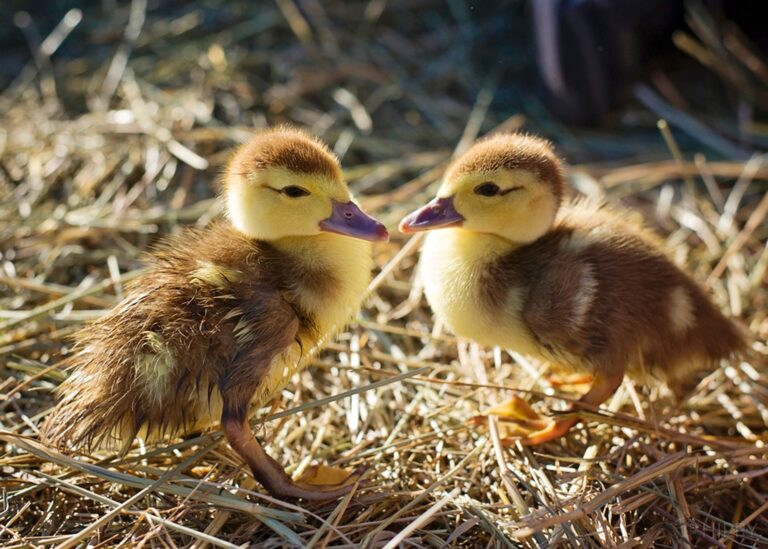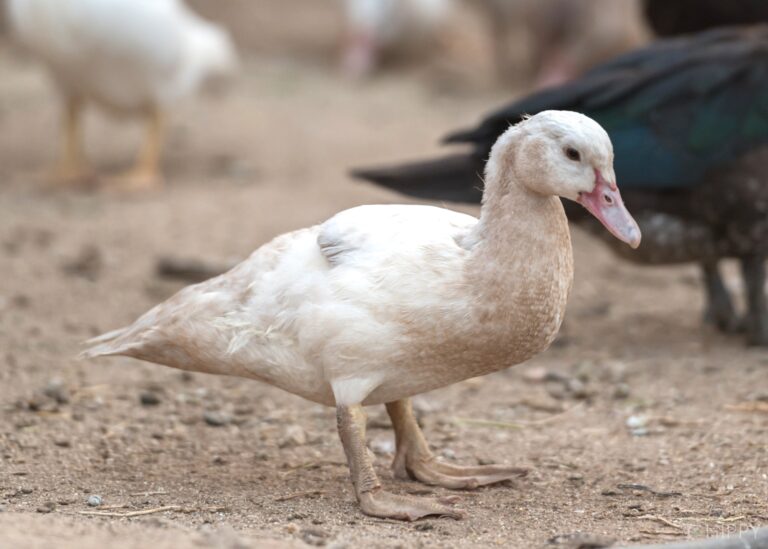Part of taking care of any livestock is understanding how long they might live. When it comes to poultry like ducks, typical lifespan impacts things like overall health but also expected yearly egg output and tempo.

Important metrics for flock management, to be sure! And, not for nothing, if you just have pet ducks or a small backyard hobby flock, you want to know how much time you can expect with your feathered friends.
Accordingly, the lifespan of your birds is just something you need to know. Let’s look at Muscovies, for instance. How long do Muscovies live?
Domestic Muscovies live between 8 and 12 years in captivity, living about 10 years on average. Genetics, environmental factors, and others will influence their overall lifespan, and some can live far longer.
When it comes to ducks, Muscovies are pretty long-lived, and occasionally they can live even longer than 12 years. In any case, this is one relationship that you know will go the distance. Keep reading, and I’ll tell you more about the lifespans of Muscovy ducks…
Do Wild Muscovies Live Longer than Domestic Birds?
As a general rule, domestic Muscovies live a lot longer than wild ones, assuming they aren’t slaughtered.
Whereas domestic birds will live anywhere from 8 to 12 years as a rule of thumb, most wild Muscovies will be lucky if they live even 8 years.
This is because the perils of predation, the harshness of living in the wild, sometimes scarcity of food, competition for mates, and many other factors all add up to a drastically reduced lifespan.
It’s just the way it is. Our birds certainly enjoy a higher quality of life, and a much longer lifespan accordingly, due to our care and attention.
The Absolute Longest a Domestic Muscovy Might Live
If you’re looking at the typical lifespan, the longest a Muscovy is expected to live is about 12 years, but this is not to say they can’t live longer. Often they will, a lot longer, up to 20 years if you can believe it!
Although it’s atypical, maybe even uncommon, I wouldn’t go so far as to say it’s rare, and certainly not unheard of. Many bird species tend to be very long-lived, especially if they don’t die of illness, injury, neglect, or predation – and Muscovies are no exception.
Just something to keep in mind and be prepared for if you are keeping Muscovies as pets or a hobby flock: they might be with you for a whole lot longer than you bargained for!
Do Drakes or Hens Live Longer?
Generally, hens live longer than drakes, even in captivity.
This is because drakes have a lot more testosterone in their system, and benefit from drastically greater mass in the form of longer and thicker bones, significantly greater musculature, and more, it often reduces their lifespan.
Plus, drakes are responsible for fending off suitors and, to a degree, predators, and living life on the edge in a high-stress mode, compared to hens, also correspondingly shortens their lives.
Particularly concerning wild Muscovies, males tend to live relatively short lives because fights over breeding access to females can be downright brutal.
Plus, when they’re watching over a nest with their mate and eggs in it, they will fearlessly intervene when a predator approaches, even an animal they have no hope of tackling.
Best case scenario, the predator might take the male and leave the female and eggs unharmed. As you might guess, this does not contribute at all to a long life!
Even if doted on and given the best possible nutrition and care in captivity, you’ll rarely see the males live as long as the females. This is common in many animals, not just ducks.

Factors Influencing Their Lifespans
Concerning your domestic flock, several factors will influence their lifespan, and you do have control over these to a degree, at least.
The other major factor, genetics, you can’t control but can mitigate; buying your ducks from good breeders or hatcheries that carefully manage lineages tends to give you birds with good health and longevity.
Overall Wellness: Taking good care of your flock means that they will live longer through a combination of reduced stress, fewer instances of illness, reduced parasite load, and more.
Making sure they have plenty of room, a clean water source and an ideal flock size will also promote wellness and result in a longer lifespan- usually!
Predation: Predators are now, as always, going to be a major threat to poultry, including your Muscovies. Dogs (domestic and feral), coyotes, foxes, bobcats, mountain lions and larger birds of prey (owls, eagles, some hawks) are common killers of Muscovies.
These hefty birds are often unable to get away in time when a predator strikes, meaning staying vigilant and suppressing attacks as well as providing a secure enclosure that can keep sneaky creatures out is critical for keeping your birds alive.
Even in the case that one or more of your ducks survive a predator attack, the injuries, and the aftermath thereof, might shorten their lives significantly.
Hygiene: Your Muscovies are like every other animal, and they won’t live as long if they are kept in a filthy environment.
You have to stay on top of collecting food scraps, managing mud, cleaning up droppings, and more if you want to keep germs and parasites at bay. Defer cleaning up and your flock will suffer!
Environmental Stress: Muscovies do pretty well in hot, humid conditions owing to their Central and South American heritage, but they still need shade and plenty of water. If they can’t take shelter or stay hydrated, their health will suffer, and their lifespan will be shortened.
Likewise, they don’t do too well in very cold environments, and sustained frigid conditions over time will impact their lifespan in kind.
Nutrition: Good nutrition and supplementation are only going to help your Muscovies thrive and live as long as possible. If your birds aren’t getting enough calories or are lacking crucial vitamins, minerals and other nutrients needed for good health, they won’t have the vitality that they could. A pronounced lack of any (or all) will seriously degrade their health and their lifespan!
Tim is a farm boy with vast experience on homesteads, and with survival and prepping. He lives a self-reliant lifestyle along with his aging mother in a quiet and very conservative little town in Ohio. He teaches folks about security, prepping and self-sufficiency not just through his witty writing, but also in person.
Find out more about Tim and the rest of the crew here.
